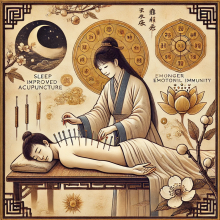
Enhancing Health and Wellness with Traditional Chinese Medicine
Welcome to the world of acupuncture, a time-honored practice rooted in Traditional Chinese Medicine (TCM). As doctors of TCM, you understand the significance of this ancient healing art. In this article, we will delve into the wonders of acupuncture, highlighting its therapeutic benefits and why it can be an invaluable addition to your medical practice. Whether you are a seasoned practitioner or just starting your journey, let's explore how acupuncture can contribute to the well-being of your patients and enhance your expertise.
- Understanding Acupuncture: Acupuncture is a key component of TCM, involving the insertion of thin, sterile needles into specific points on the body. These points, known as acupoints, correspond to energy pathways called meridians, through which vital life force, or Qi, flows. By stimulating these acupoints, acupuncture aims to restore the balance and harmony of Qi, promoting optimal health and well-being.
- Holistic Approach to Healing: One of the remarkable aspects of acupuncture is its holistic approach to healing. Unlike conventional medicine that often focuses on treating isolated symptoms, acupuncture considers the entire person—mind, body, and spirit—as an interconnected system. By addressing the root causes of illness and imbalance, acupuncture offers a comprehensive approach to healing, targeting not only the symptoms but also the underlying imbalances.
- Therapeutic Benefits: Acupuncture provides a wide range of therapeutic benefits, making it a valuable tool in your practice. Some of the common conditions that can be effectively treated with acupuncture include:
- Pain Management: Acupuncture has long been recognized for its efficacy in relieving pain, whether it's chronic pain, migraines, arthritis, or postoperative discomfort. By stimulating the acupoints, acupuncture helps release endorphins, the body's natural painkillers, and promotes better blood circulation, providing significant pain relief.
- Stress Reduction: In today's fast-paced world, stress has become a prevalent health concern. Acupuncture offers a natural and effective way to alleviate stress and promote relaxation. By regulating the nervous system and reducing cortisol levels, acupuncture helps restore balance, leading to improved mental and emotional well-being.
- Digestive Disorders: Acupuncture can effectively address a range of digestive issues such as indigestion, irritable bowel syndrome (IBS), and acid reflux. By stimulating specific acupoints, it helps regulate digestive functions, reduce inflammation, and restore digestive harmony.
- Emotional and Mental Health: Acupuncture is renowned for its positive impact on emotional and mental well-being. It can help alleviate symptoms of anxiety, depression, insomnia, and addiction by promoting the release of neurotransmitters and regulating the body's stress response.
- Complementing Traditional Chinese Medicine: As doctors of TCM, integrating acupuncture into your practice can greatly enhance your treatment options. Acupuncture works synergistically with other TCM modalities such as herbal medicine, cupping therapy, and moxibustion, amplifying the overall therapeutic effect. By combining various TCM techniques, you can offer your patients a comprehensive and personalized approach to healing.
Conclusion:
In the realm of Traditional Chinese Medicine, acupuncture stands as a profound and time-honored healing art that holds immense potential to enhance the well-being of your patients. By embracing acupuncture as an integral part of your practice, you can expand your treatment repertoire and empower yourself to provide holistic care. Remember, the power of acupuncture lies not only in its technique but also in your intention and dedication to providing compassionate care. Together, let us embark on this path of healing and bring the incredible benefits of acupuncture to those seeking a balanced and harmonious life.
